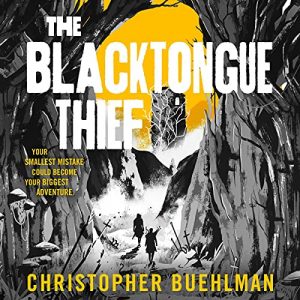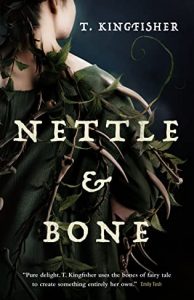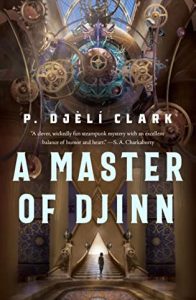 The Daughters' War (Blacktongue, #0) by Christopher Buehlman
The Daughters' War (Blacktongue, #0) by Christopher Buehlman Narrator: Nikki Garcia
Format: audiobook, eARC
Source: supplied by publisher via Edelweiss, supplied by publisher via NetGalley
Formats available: hardcover, paperback, ebook, audiobook
Genres: epic fantasy, fantasy, grimdark
Series: Blacktongue #0
Pages: 416
Length: 13 hours and 14 minutes
Published by Macmillan Audio, Tor Books on June 25, 2024
Purchasing Info: Author's Website, Publisher's Website, Amazon, Barnes & Noble, Kobo, Bookshop.org, Better World Books
Goodreads
Enter the fray in this luminous new adventure from Christopher Buehlman, set during the war-torn, goblin-infested years just before The Blacktongue Thief .
The goblins have killed all of our horses and most of our men.
They have enslaved our cities, burned our fields, and still they wage war.
Now, our daughters take up arms.
Galva ― Galvicha to her three brothers, two of whom the goblins will kill ― has defied her family’s wishes and joined the army’s untested new unit, the Raven Knights. They march toward a once-beautiful city overrun by the goblin horde, accompanied by scores of giant war corvids. Made with the darkest magics, these fearsome black birds may hold the key to stopping the goblins in their war to make cattle of mankind.
The road to victory is bloody, and goblins are clever and merciless. The Raven Knights can take nothing for granted ― not the bonds of family, nor the wisdom of their leaders, nor their own safety against the dangerous war birds at their side. But some hopes are worth any risk.
My Review:
I finished The Daughters’ War for the second time over the weekend, but I was so deeply into the story, the characters and simply the world between the pages that I had to sit on even attempting to write a review for a bit – to let the SQUEE calm down some. But I also felt compelled to reread the first book set in this world, The Blacktongue Thief – which I did. Which didn’t tone the SQUEE down AT ALL.
The book hangover was huge after my first read of Blacktongue, and after my first read of The Daughters’ War earlier this year for Library Journal, but this time I listened to the thing – and the book hangover is absolutely epic.
Now let me attempt an explanation – which is still going to have a LOT of SQUEE in it. Because damn I loved this book – and I fell hard into Blacktongue again, too. So hard.
The title of this book immediately tells the reader just how badly this world is totally wrecked. You see, the first war between humans and goblins was the Knights’ War, because the noble Knights beat the goblins back on their swift and equally noble horses. So the goblin mages created a poison, a bioweapon, that killed all the horses. The second war, not even a decade later, was the Threshers’ War, because the goblins cut the untrained farm boys sent to fight it like they were threshing wheat. This war is the Daughters’ War because that’s pretty much all that’s left to fight this time around, less than a decade after the end of the Threshers’.
This is one of the rarest of rare cases where the old saying that “There never was a good war or a bad peace” doesn’t feel strictly true. Because the goblins USED those brief years of peace while the humans WASTED them.
Readers of The Blacktongue Thief will remember Galva as she will be, as in that story she’s 30 years old, a hard-bitten, cynical, heart-sore veteran of the Daughters’ War, on a mad quest to save her queen, her country, and quite possibly her whole entire species from the idiocy of the so-called powers that be who seem to be wasting yet another peace.
The story of this book, The Daughters’ War, is the story of how this Galva got to be that Galva. How the 20 year old swordswoman and newly fledged Corvid (read that as war-raven or murder-bird) knight came of age, lost her innocence and her naiveté, as well as her faith in pretty much everything she once believed, including her family and her country – or at least the king who usurped its throne.
So this is Galva’s story, which means it’s a story about the cost of war and the price of peace, and the question of which one is higher than the other and whether either will prevent the actual extinction of the human race. Because it’s also a story about the damage a small man can do to shield himself from the knowledge that he is truly small and the way that power and privilege can blind a whole society to the destruction that is happening all around them because they rather maintain their power than save everyone’s future – including their own.
And over and under and through all of that, The Daughters’ War is a poignant, lyrical, heartbreaking paean to times and places that are no more, told by someone who develops a truly cynical perspective on command and control and the lack thereof and the high price that may be paid because humans are gonna human even if it kills them all.
 Escape Rating A++: I don’t give A++ ratings often as that’s kind of the point of the thing, but The Daughters’ War absolutely earned one – as did The Blacktongue Thief three years ago. My one and only disappointment with this book is that I can’t seem to find any information on whether or not the author will be returning to this world – but that was also true after Blacktongue so I still have hope.
Escape Rating A++: I don’t give A++ ratings often as that’s kind of the point of the thing, but The Daughters’ War absolutely earned one – as did The Blacktongue Thief three years ago. My one and only disappointment with this book is that I can’t seem to find any information on whether or not the author will be returning to this world – but that was also true after Blacktongue so I still have hope.
After all, Galva’s – and Kinch’s – world is so FUBAR’d that there are plenty of possibilities for more stories where these two came from. And I want them. BAD. Seriously BAD.
Ahem…
I keep talking about the two books, The Daughters’ War and The Blacktongue Thief, as though they are intertwined. Only because they are. Blacktongue was published first, but Daughters’ War comes first in the internal chronology. So it doesn’t matter which one you read first. Whichever one you can get first will be fine – especially if you like your epic fantasy with more than a bit of grimdark – because their world is very grim – and both Galva and Kinch are VERY cynically aware of that grimness.
Although I have friends who don’t like grimdark who STILL enjoyed Blacktongue, that I think I’ve convinced to read Daughters’ War. The author does such an excellent job of getting inside his characters’ heads to let the reader – or especially listener – see the world from their point of view that he carries the reader through the grimdark exceedingly well. I fully admit, however, that I got so into the characters and their perspectives that both books made me cry more than once each.
The stories are a bit different in tone, as Kinch is an extremely unreliable narrator and Galva is the exact opposite. She hates lies, lying and liars, while he can’t stop any of the above – sometimes not even to himself. He’s also a bit of an optimist in spite of his circumstances, while she’s definitely a pessimist.
Both stories are told in the first-person singular, so we spend the entire story inside each of their heads. Which does serve as a kind of a hint that they each survive their own adventures. It’s the audiobook that really got me in both cases, not just that we see the world from their perspectives, but that excellent choices were made for narration in both cases (the author chose himself for Kinch which says something about several somethings but absolutely worked). So if you like audiobooks these are excellent and Nikki Garcia did every single bit as fantastic a job “being” Galva as the author did Kinch.
I have to conclude this review and I honestly don’t want to. I simply do not want to be done with this world and these characters. I hope that this review and my general, overall squee about the marvels of this series will convince you to give it a try as well. Because both books are seriously awesome and well worth a read – or even better – a listen.

 A Sorceress Comes to Call by
A Sorceress Comes to Call by  Escape Rating A+: This wasn’t what I expected, although having read quite a bit of the author’s work, I probably should have.
Escape Rating A+: This wasn’t what I expected, although having read quite a bit of the author’s work, I probably should have.  Which is when I felt like I got hit with a clue-by-four, to the point of chagrin that I didn’t figure out a whole bunch of things sooner. Not the way that Hester got the best of the sorceress, but rather the way that the story as a whole worked. And, as I mulled things over more than a bit, the way that
Which is when I felt like I got hit with a clue-by-four, to the point of chagrin that I didn’t figure out a whole bunch of things sooner. Not the way that Hester got the best of the sorceress, but rather the way that the story as a whole worked. And, as I mulled things over more than a bit, the way that  The Dead Cat Tail Assassins by
The Dead Cat Tail Assassins by  Escape Rating A+: I picked this up because I adored the author’s
Escape Rating A+: I picked this up because I adored the author’s  In the Shadow of the Fall (Guardians of the Gods, #1) by
In the Shadow of the Fall (Guardians of the Gods, #1) by  Something which I’m sure is intended to happen in the second book in the duology,
Something which I’m sure is intended to happen in the second book in the duology,  The Price of Redemption (Tides of Magic, #1) by
The Price of Redemption (Tides of Magic, #1) by  But one of the most respected AND popular ‘spin offs’ from this particular war is the
But one of the most respected AND popular ‘spin offs’ from this particular war is the  Daughters of Olympus by
Daughters of Olympus by  Ivy, Angelica, Bay by
Ivy, Angelica, Bay by 
 On the Fox Roads by
On the Fox Roads by 
 The Fireborne Blade (The Fireborne Blade, #1) by
The Fireborne Blade (The Fireborne Blade, #1) by  Escape Rating A-: Initially, this seemed like a rather traditional knight vs. dragon story, with one of two inevitable endings. Either the knight dies or the dragon does. Or occasionally both in a blaze of mutual glory. So there’s three inevitable endings.
Escape Rating A-: Initially, this seemed like a rather traditional knight vs. dragon story, with one of two inevitable endings. Either the knight dies or the dragon does. Or occasionally both in a blaze of mutual glory. So there’s three inevitable endings. And in the process of telling its story about the knight and the dragon, it asks some surprising questions about change vs stability and striking that balance, and makes that discussion personal in ways that change every single thing we thought we knew going in.
And in the process of telling its story about the knight and the dragon, it asks some surprising questions about change vs stability and striking that balance, and makes that discussion personal in ways that change every single thing we thought we knew going in. "One Man's Treasure" by Sarah Pinsker in Uncanny Magazine Issue 50, January-February 2023 by
"One Man's Treasure" by Sarah Pinsker in Uncanny Magazine Issue 50, January-February 2023 by